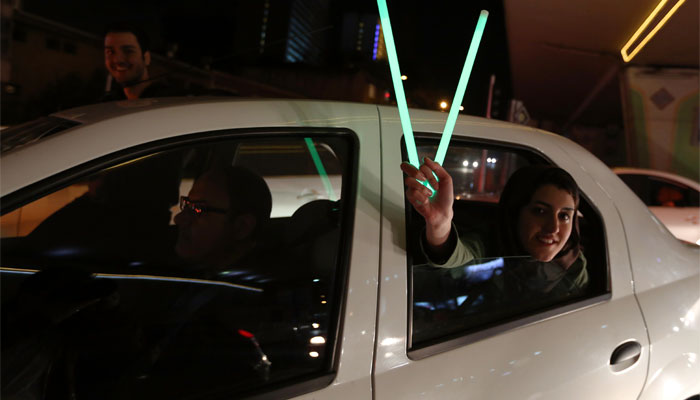A woman in a car flashes the "V for Victory" sign with neon lights as people celebrate on Valiasr street in northern Tehran. AFP
AFP/Reuters/Jerusalem/Vilnius/Moscow
Israel warned Friday that Iran's framework accord with world powers on its controversial nuclear programme was "very dangerous," accusing Tehran of seeking an atomic weapon.
"This framework (agreement) is a step in a very, very dangerous direction," government spokesman Mark Regev told journalists, adding that Iran's "single goal" behind the accord was to build a nuclear bomb.
"Not only does it leave Iran with an expensive nuclear infrastructure but it fails to shut down even a single Iranian nuclear installation. It leaves Iran with thousands of centrifuges to continue to enrich uranium," Regev said.
"It allows Iran to conduct research and development to build new and better centrifuges," he added.
Iran and world powers struck an outline agreement in Switzerland on Thursday paving the way for Tehran to curtail its nuclear activity in exchange for relief from punishing economic sanctions.
Israel has long opposed such a deal, with officials calling the interim accord a "historic mistake".
Turkey welcomes agreement
Turkey welcomed an initial agreement between Iran and world powers on curbing Tehran's nuclear programme but said on Friday it hoped Tehran would go further by the deadline for a final deal at the end of June.
Iran and six world powers, known as the P5+1, agreed a framework deal in Lausanne, Switzerland, on Thursday which is contingent on reaching a final agreement by June 30.
Turkey and Brazil mediated previous negotiations over Iran's disputed nuclear programme in 2010.
"When we look at the positions (of the) P5+1 right now, Iran is still below the line we were able to bring in 2010, but we hope Iran will come to that line," Turkish Foreign Minister Mevlut Cavusoglu said during a trip to Lithuania.
"As Turkey we are very pleased that negotiations held with the P5+1 have ended in political understanding. (We are) happy to see consensus on the general framework of a final agreement. I hope the parties will reach final agreement," he said.
Separately, Turkish Finance Minister Mehmet Simsek said the deal, which could pave the way for the lifting of economic sanctions on Iran, would help boost Turkey's exports to its neighbour and help bring down global oil prices.
Russia says ready to process fuel
Russian diplomats involved in the historic framework accord limiting Iran's nuclear programme said Friday Moscow's atomic energy agency, Rosatom, was ready to provide Tehran with new reactor fuel and process spent rods.
"The Russian Federation and Rosatom are ready to supply new fuel and process irradiated fuel in existing reactors, and those Iran will be building," said Russian Deputy Foreign Minister Sergei Ryabkov according to Russia's Interfax press agency.
Ryabkov that added the offer applied "to reactors constructed in Iran with a Russian project involving Russian participation."
"The question remains very difficult for other reactors (whose construction) Russia was not involved in, and we are not ready to provide our position on it."
Last November Moscow concluded accords with Iran to build two new reactors at its Bushehr plant -- which was officially delivered to Tehran in 2013 -- and signed protocols to construct an additional four reactors on other sites.
Despite questions still hovering over that issue and several others in the framework accord concluded Thursday, Ryabkov hailed the accomplishment of hammering out agreements on most aspects of the deal to limit Iran's nuclear programme to strictly civil purposes.
"We can be proud of ourselves," he said, urging that between now and the final accord due by July, economic sanctions against Iran should be lifted "immediately."
The agreement marked a major breakthrough in a 12-year standoff between Iran and the West -- which has long feared Tehran wants to build a nuclear bomb -- and raised hopes the deal could help stability in the Middle East.
Under the deal Iran's stocks of highly enriched uranium will be cut by 98 percent for 15 years, while its unfinished Arak reactor will not produce weapons-grade plutonium.
It will also commit Iran to reducing by roughly two-thirds -- to 6,104 from around 19,000 -- the number of uranium centrifuges, which can make fuel for nuclear power but also the core of a nuclear bomb.

